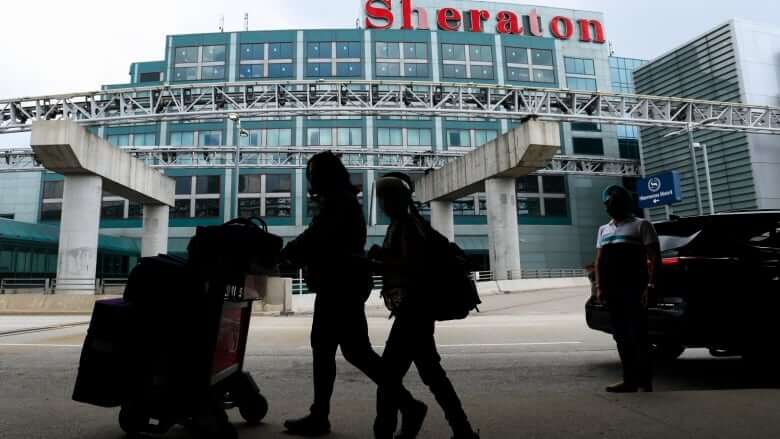Some international travel restrictions easing July 5 for fully vaccinated people with proof

Fully vaccinated Canadians and permanent residents will be able to enter Canada without undergoing quarantine starting the night of July 5, the federal government announced today.
Why $2,000 for a hotel quarantine? Your questions about Ottawa’s new travel rules answered
The news comes as many Canadian provinces have hit key vaccination targets, with more than 75 per cent of eligible Canadians having received at least one dose and over 20 per cent having received two. Canadians and permanent residents who are fully vaccinated won’t be able to simply walk through customs, however.
According to officials at a government briefing for journalists, those entering will need to show documents proving they received doses of vaccines approved in Canada at least 14 days prior to entering the country.
Officials said travellers must electronically submit COVID-19-related information to the government’s ArriveCAN app before arriving, meet the pre- and on-arrival test requirements, be asymptomatic and have a suitable quarantine plan.
“Final determination regarding exemptions is made by a government representative at the border based on the information presented at the time of entry into Canada, which is why a quarantine plan is still required,” said a government media statement.
If approved, those accepted travellers will not have to quarantine. Those arriving by air will also not be forced to stay at a government-authorized hotel and non-vaccinated children or dependent adults travelling with them will also be exempt from the hotel stay. Children who aren’t vaccinated will be able to go home with their parents, but must quarantine for two weeks, said an official speaking on background.
There are no changes to border restrictions for travellers who are not fully vaccinated. Those who land by air will still have to stay in hotel quarantine for up to three days pending a negative arrival test, quarantine at home for the remainder of the 14-day period and take a test on day eight of their self-isolation period.
Canadians still advised to avoid non-essential travel
The easing also does not apply to foreign nationals. Ottawa announced Friday it would be continuing existing restrictions at the Canada-U.S. border for at least another month, until July 21.
“At this time, the Government of Canada continues to strongly advise Canadians to avoid non-essential travel,” said Public Safety Minister Bill Blair. “Although the future is looking brighter than it has for a long time, with COVID-19 cases on a downward trend and vaccination efforts going well across the country, we can’t let our guard down.”
Maryscott Greenwood, CEO of the Canada America Business Council, said she’s frustrated by the federal government’s rationale for not allowing fully-vaccinated U.S. citizens into the country.
“What’s the difference between fully vaccinated Canadians and fully vaccinated Americans? Unless you work for the NHL, in which case I guess there’s a special exemption,” she said.
“It’s frustrating, not only to Americans but to Canadian businesses that we work with on a daily basis. We need to get back into a place where we’re able to do business in a safe way and Canada is, for reasons that are really puzzling to us, quite reluctant.”
Health Minister Patty Hajdu said she’s still consulting with provinces about the next phase of easing travel restrictions. Goldy Hyder, president and CEO of the Business Council of Canada, said the government should have a clear plan for opening international travel.
“A transparent plan with clear benchmarks to reopen travel would be a powerful tool for encouraging Canadians to get fully vaccinated. The Council is disappointed that the government hasn’t seen fit to tell Canadians what they can look forward to as the vaccination campaign rolls on,” he said in a statement.
“I’m disappointed, too, that the light at the end of the tunnel is still a long ways off for Canada’s battered travel, tourism and hospitality sectors.”
The new rules kick in July 5 at 11:59 p.m. ET. Immigration Minister Marco Mendicino also announced that individuals approved for permanent residence may travel to Canada as of June 21. Previously, foreign nationals who held a valid confirmation of permanent residence issued on or before March 18, 2020, were exempt from Canada’s travel restrictions.








Redes Sociais - Comentários